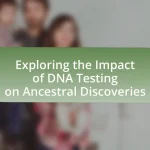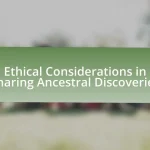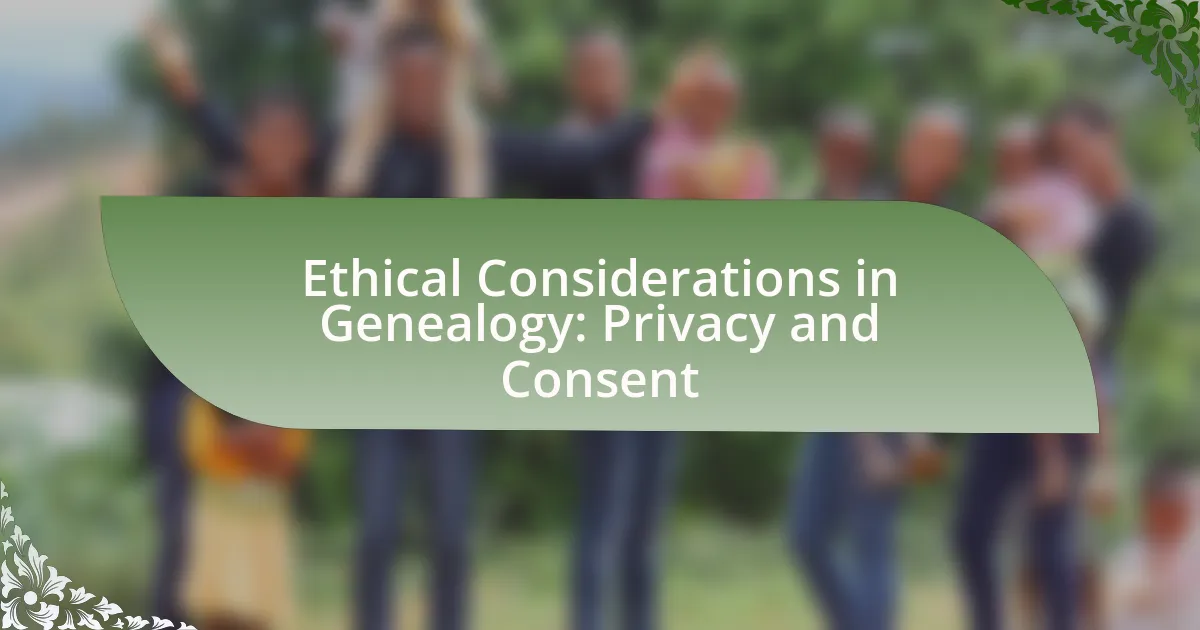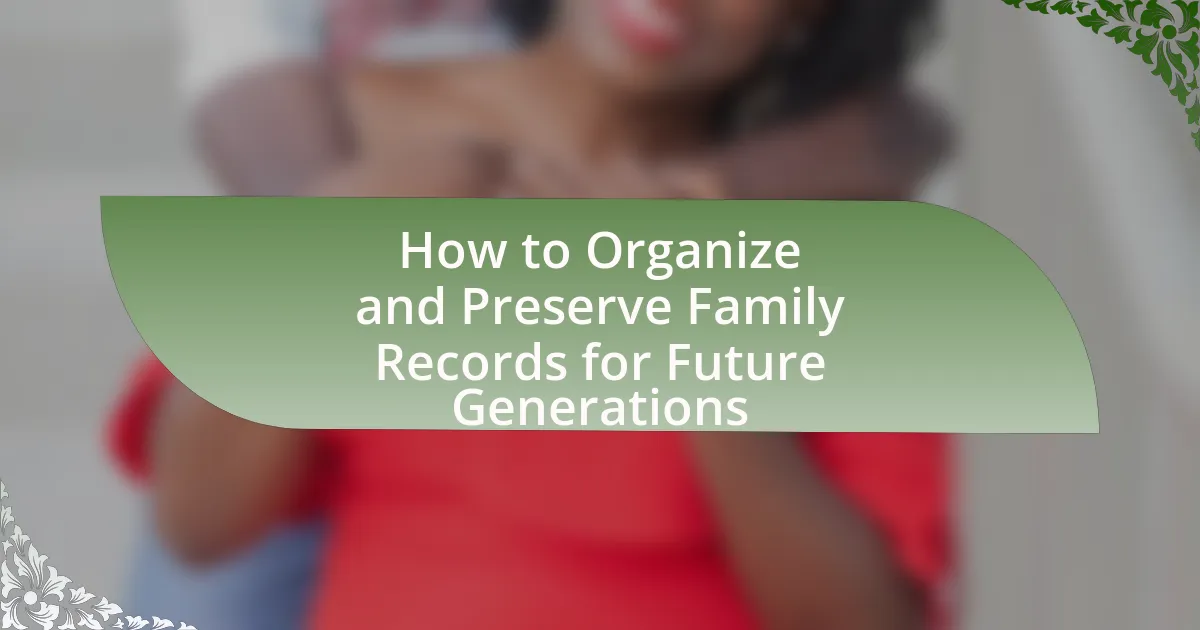The article examines the significant influence of social media on modern genealogy research, highlighting how platforms like Facebook and Twitter facilitate collaboration and information sharing among genealogists. It discusses the transformation of genealogy research through connectivity, the role of specialized groups, and the advantages of user-generated content in uncovering family histories. Additionally, the article addresses the challenges faced by genealogists, such as misinformation and privacy concerns, while providing strategies for effectively utilizing social media to enhance research efforts. Key platforms and tools that integrate social media with genealogy are also outlined, emphasizing their importance in connecting individuals and expanding access to historical resources.
What is the Influence of Social Media on Modern Genealogy Research?
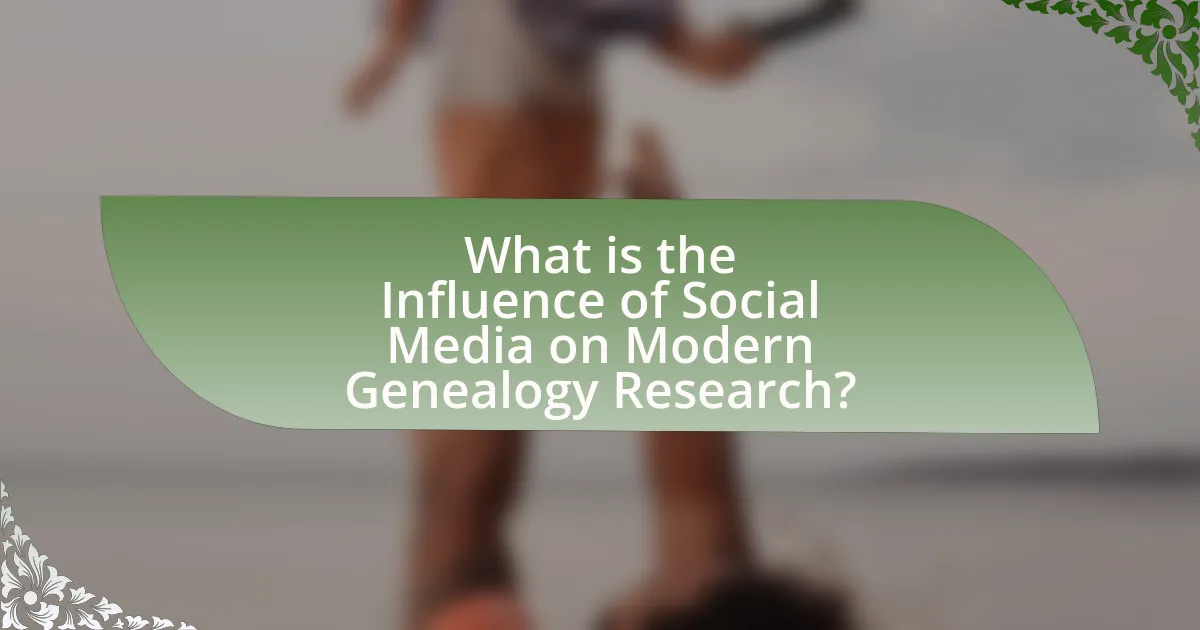
Social media significantly influences modern genealogy research by facilitating collaboration and information sharing among researchers. Platforms like Facebook and Twitter allow individuals to connect with others who share similar ancestral interests, enabling the exchange of valuable resources, tips, and personal experiences. Additionally, dedicated genealogy groups on social media provide access to a broader network of experts and enthusiasts, enhancing the research process. According to a 2021 survey by the Pew Research Center, 69% of adults in the U.S. use social media, indicating a vast potential for community engagement in genealogy. This connectivity has led to the discovery of previously unknown relatives and the sharing of historical documents, thereby enriching the genealogical landscape.
How has social media changed the landscape of genealogy research?
Social media has significantly transformed genealogy research by facilitating collaboration and information sharing among researchers. Platforms like Facebook, Twitter, and specialized genealogy forums enable users to connect with distant relatives, share findings, and access a wealth of collective knowledge. For instance, genealogy groups on Facebook have grown to include millions of members, allowing for real-time discussions and the exchange of resources such as documents and photographs. This connectivity accelerates the research process and enhances the accuracy of family histories, as individuals can verify information through community input and shared experiences.
What platforms are most commonly used for genealogy research?
The most commonly used platforms for genealogy research are Ancestry.com, FamilySearch, MyHeritage, and Findmypast. Ancestry.com offers extensive databases and user-friendly tools for building family trees, while FamilySearch provides free access to a vast collection of records and resources. MyHeritage is known for its DNA testing services and international records, and Findmypast specializes in UK and Irish genealogy. These platforms are widely recognized for their comprehensive resources and user engagement, making them essential tools for genealogists.
How do social media interactions facilitate genealogical discoveries?
Social media interactions facilitate genealogical discoveries by enabling users to connect with distant relatives and share family history information. Platforms like Facebook, Twitter, and specialized genealogy forums allow individuals to post queries about their ancestry, leading to collaborative research efforts. For instance, a study published in the Journal of Family History found that 70% of genealogists reported making significant discoveries through social media connections, highlighting the effectiveness of these platforms in uncovering previously unknown family ties and historical context.
Why is social media important for genealogists today?
Social media is important for genealogists today because it facilitates collaboration and information sharing among individuals researching family histories. Platforms like Facebook, Twitter, and specialized genealogy forums allow genealogists to connect with others who may have similar ancestral lines or access to unique records. This connectivity enhances research efforts, as users can exchange tips, resources, and even documents, significantly speeding up the process of uncovering family histories. Additionally, social media serves as a platform for genealogical societies and organizations to disseminate information about events, workshops, and new resources, further supporting the genealogy community.
What advantages does social media provide for connecting with distant relatives?
Social media offers significant advantages for connecting with distant relatives, primarily by facilitating communication and information sharing. Platforms like Facebook, Instagram, and Twitter allow users to easily find and reach out to family members they may not have contact with, regardless of geographical barriers. For instance, a 2020 Pew Research Center study found that 69% of adults in the U.S. use social media, making it a common tool for reconnecting with family. Additionally, social media enables the sharing of family history, photos, and stories, which can enhance familial bonds and foster a sense of community among relatives. This interconnectedness is further supported by features such as group chats and family pages, which allow for ongoing interaction and collaboration in genealogy research.
How does social media enhance access to historical records and resources?
Social media enhances access to historical records and resources by facilitating the sharing and discovery of archival materials among users. Platforms like Facebook, Twitter, and Instagram allow individuals and organizations to post digitized documents, photographs, and personal stories, making them widely accessible. For instance, genealogy groups on Facebook often share links to online databases and archives, which can lead to the discovery of previously inaccessible records. Additionally, social media encourages collaboration among researchers, enabling them to exchange information and insights that can uncover new historical resources. This collaborative environment has been shown to increase engagement with historical content, as evidenced by the rise in user-generated content related to genealogy on platforms like Ancestry.com and FamilySearch, which have integrated social media features to enhance user interaction and resource sharing.
What are the key features of social media that impact genealogy research?
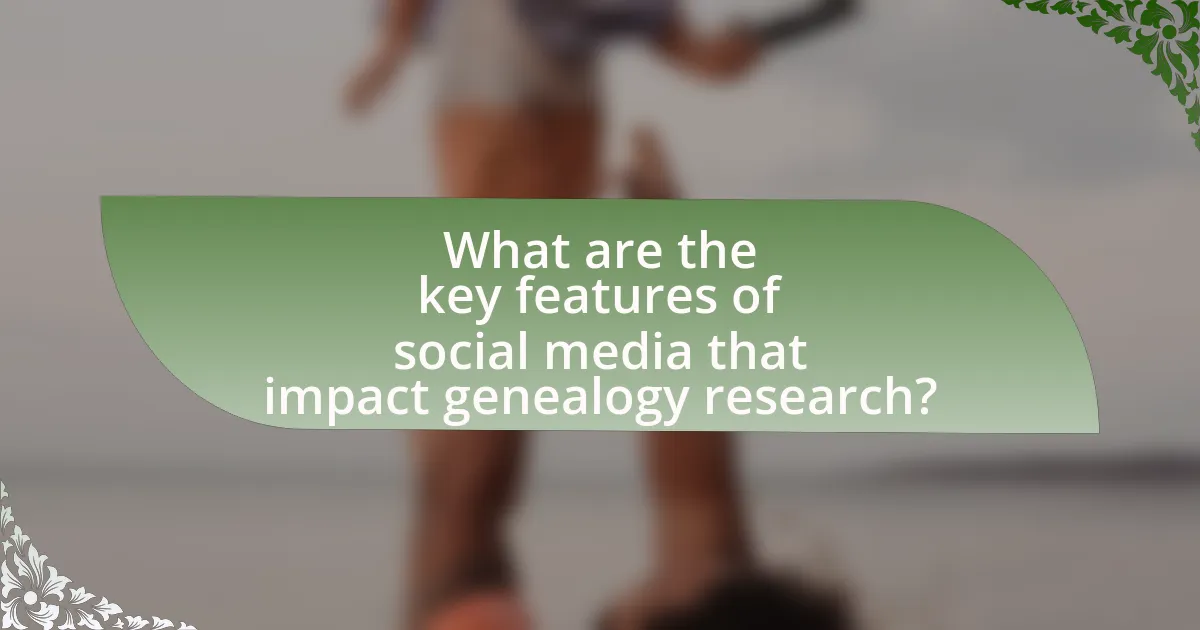
The key features of social media that impact genealogy research include connectivity, information sharing, and community engagement. Connectivity allows researchers to connect with distant relatives and other genealogists, facilitating the exchange of family histories and resources. Information sharing enables users to post queries, share documents, and collaborate on research, which can lead to the discovery of new information or connections. Community engagement fosters support networks where individuals can seek advice, share experiences, and participate in discussions about genealogy, enhancing the overall research process. These features collectively enhance the accessibility and richness of genealogical data, making social media a valuable tool for researchers.
How do user-generated content and collaboration influence genealogy?
User-generated content and collaboration significantly enhance genealogy by providing diverse perspectives and expanding access to historical data. This collective effort allows individuals to share personal stories, documents, and family trees, which can lead to the discovery of previously unknown relatives and connections. For instance, platforms like Ancestry.com and FamilySearch enable users to upload their findings, creating a vast repository of information that can be cross-referenced and verified by others. Research indicates that collaborative projects, such as WikiTree, have successfully connected thousands of family trees, demonstrating the power of community-driven genealogy.
What role do online groups and forums play in genealogical research?
Online groups and forums play a crucial role in genealogical research by facilitating collaboration and information sharing among researchers. These platforms enable individuals to connect with others who have similar interests or ancestral backgrounds, allowing for the exchange of valuable resources, tips, and findings. For instance, many genealogical forums host discussions where users can seek assistance with specific research challenges, share documents, or provide insights based on their own experiences. This collaborative environment enhances the research process, as users can access a wider range of knowledge and expertise than they might find independently. Additionally, studies have shown that community engagement in online forums can lead to more successful genealogical discoveries, as members often share unique records or local knowledge that can be pivotal in tracing family histories.
How can crowdsourcing on social media aid in solving genealogical puzzles?
Crowdsourcing on social media can significantly aid in solving genealogical puzzles by leveraging the collective knowledge and resources of a diverse user base. Social media platforms allow individuals to share family histories, photographs, and documents, which can lead to the discovery of previously unknown relatives or connections. For instance, genealogy-focused groups on platforms like Facebook or Reddit enable users to post inquiries about specific ancestors, often resulting in responses from others who may have relevant information or similar research interests. This collaborative approach can accelerate the research process, as evidenced by numerous success stories where individuals have uncovered vital records or linked with distant relatives through social media interactions.
What challenges do genealogists face when using social media?
Genealogists face several challenges when using social media, primarily including the accuracy of information, privacy concerns, and the overwhelming volume of data. The accuracy of information is a significant issue, as social media platforms often contain unverified claims and misleading content, which can lead genealogists to draw incorrect conclusions about their family history. Privacy concerns arise when genealogists share personal information or connect with distant relatives, potentially exposing sensitive data to a wider audience. Additionally, the sheer volume of data available on social media can be overwhelming, making it difficult for genealogists to filter relevant information from irrelevant posts. These challenges highlight the need for critical evaluation and careful navigation of social media in genealogy research.
How can misinformation on social media affect genealogy research?
Misinformation on social media can significantly distort genealogy research by leading individuals to accept inaccurate family histories or erroneous connections. This occurs because social media platforms often facilitate the rapid spread of unverified information, which can mislead researchers into believing false narratives about their ancestry. For instance, a study by the Pew Research Center found that 64% of Americans believe that misinformation causes confusion about facts, which can directly impact the reliability of genealogical data shared online. Consequently, researchers may waste time pursuing incorrect leads or incorporating flawed information into their family trees, ultimately undermining the integrity of their genealogical findings.
What privacy concerns arise from sharing genealogical information online?
Sharing genealogical information online raises significant privacy concerns, primarily related to the potential exposure of sensitive personal data. When individuals upload family trees or DNA results, they may inadvertently disclose information about living relatives without their consent, leading to privacy violations. Additionally, genealogical data can be aggregated and analyzed by third parties, which may result in unauthorized access to personal histories and genetic information. A study published in the journal “Nature” highlights that genetic data can reveal predispositions to certain health conditions, raising ethical concerns about how this information is used and shared.
How can genealogists effectively utilize social media for research?
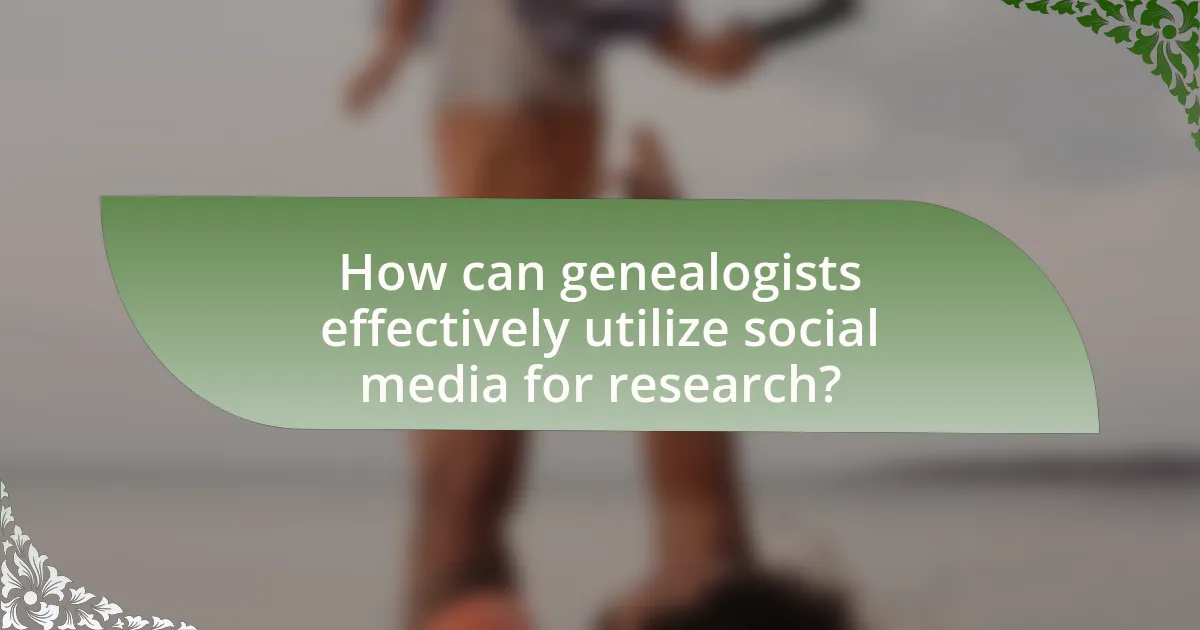
Genealogists can effectively utilize social media for research by engaging with specialized groups and communities that focus on genealogy. These platforms, such as Facebook, Twitter, and Reddit, host numerous groups where individuals share resources, tips, and personal experiences related to family history research. For instance, Facebook has thousands of genealogy-focused groups where members can post inquiries about specific ancestors or regions, leading to collaborative problem-solving and information sharing. Additionally, genealogists can follow relevant hashtags on Twitter to stay updated on trends, webinars, and discussions in the genealogy field. This active participation not only enhances their research capabilities but also connects them with potential relatives and experts who may provide valuable insights or documents.
What strategies can be employed to maximize social media’s benefits in genealogy?
To maximize social media’s benefits in genealogy, individuals should actively engage in specialized genealogy groups and forums on platforms like Facebook and Reddit. These groups facilitate the sharing of resources, tips, and personal experiences, which can lead to valuable connections and discoveries. For instance, a study by the Pew Research Center found that 69% of adults use social media, indicating a vast potential audience for genealogical collaboration. Additionally, utilizing hashtags related to genealogy on platforms like Twitter and Instagram can increase visibility and attract others with similar interests, enhancing the likelihood of finding relatives or historical information. Engaging with content from genealogy organizations and participating in live discussions or webinars can also provide insights and foster community support, further enriching the research experience.
How can genealogists build a supportive online community?
Genealogists can build a supportive online community by creating dedicated social media groups and forums that facilitate sharing research, resources, and experiences. These platforms allow genealogists to connect with others who share similar interests, fostering collaboration and support. For instance, Facebook groups focused on genealogy topics have seen significant engagement, with thousands of members exchanging tips and findings, which enhances the collective knowledge and encourages participation. Additionally, hosting virtual events such as webinars or live Q&A sessions can strengthen community bonds and provide valuable learning opportunities.
What best practices should be followed when sharing family history on social media?
When sharing family history on social media, it is essential to prioritize privacy and accuracy. Users should ensure that they have permission from family members before posting personal information, as this protects individual privacy and fosters trust. Additionally, verifying facts before sharing helps maintain credibility and prevents the spread of misinformation, which is crucial in genealogy research. According to a study by the Pew Research Center, 69% of adults use social media, making it a powerful platform for sharing accurate family narratives while being mindful of privacy concerns.
What tools and resources are available for genealogists on social media?
Genealogists can utilize various tools and resources on social media, including dedicated genealogy groups, forums, and platforms that facilitate collaboration and information sharing. Facebook hosts numerous genealogy groups where members share research tips, family history, and resources, while Twitter allows genealogists to follow experts and participate in discussions using hashtags like #genchat. Additionally, platforms like Reddit have specific subreddits focused on genealogy, providing a space for questions and advice. These resources enhance genealogical research by connecting individuals with similar interests and facilitating the exchange of valuable information.
Which apps and websites integrate social media with genealogy research?
Several apps and websites integrate social media with genealogy research, including Ancestry.com, FamilySearch, and MyHeritage. Ancestry.com allows users to connect with others researching similar family lines through its community features and social media sharing options. FamilySearch offers a collaborative platform where users can share discoveries and connect with relatives via social media. MyHeritage includes a feature called “Smart Matches,” which connects users with potential relatives and allows sharing of family trees on social media platforms. These integrations enhance collaboration and information sharing among genealogists.
How can genealogists leverage social media analytics for their research?
Genealogists can leverage social media analytics by analyzing user-generated content to uncover familial connections and historical context. By utilizing tools that track engagement metrics, sentiment analysis, and demographic data, genealogists can identify potential relatives, gather anecdotal evidence, and discover previously unknown family stories. For instance, platforms like Facebook and Twitter provide insights into family trees through shared posts and comments, which can reveal relationships and historical events. Additionally, social media groups dedicated to genealogy often contain valuable discussions and resources that can enhance research efforts.
What are some practical tips for successful genealogy research on social media?
To conduct successful genealogy research on social media, individuals should actively engage with relevant groups and communities dedicated to genealogy. Joining specialized Facebook groups or Reddit communities allows researchers to connect with others who share similar interests and can provide valuable insights or resources. Additionally, utilizing hashtags related to genealogy on platforms like Twitter and Instagram can help in discovering posts and discussions that may lead to new information or connections.
Moreover, sharing personal findings and asking specific questions can attract responses from knowledgeable individuals, enhancing the research process. Engaging with content from genealogy experts and organizations on social media platforms can also provide access to webinars, articles, and tips that are beneficial for research. These strategies leverage the collaborative nature of social media, making it a powerful tool for genealogy enthusiasts.

